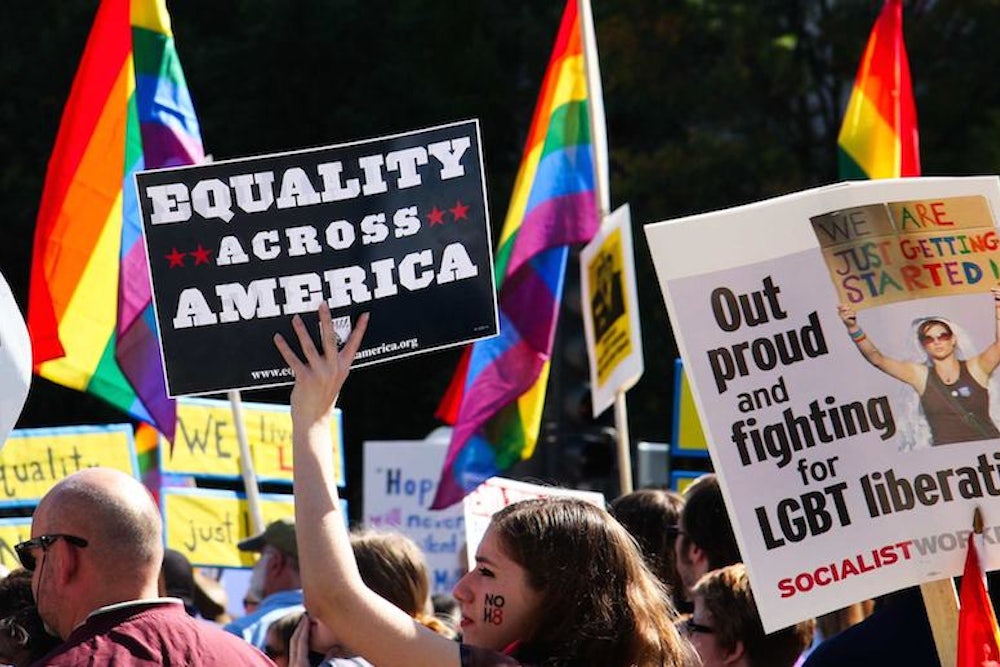There are many reasons to be skeptical of the idea that you can change someone’s mind on a hot-button political issue simply by talking to them. We hold many of our political beliefs close, and our brains are built in a way to filter out and discount evidence that challenges them. That’s part of the reason a new study in Science is so surprising: It suggests that gay canvassers were able to significantly influence voters’ beliefs about same-sex marriage with just a 20-minute conversation, that this effect lasted at least nine months after those conversation ended, and that it spread to other members of the household in question.
For the study, Michael LaCour of UCLA and Donald Green of Columbia surveyed a bunch of registered voters in Southern California to get their views on gay marriage (and a bunch of other issues, to hide the true purpose of the study), and offered them financial incentives to get friends and family members to participate as well.
Then, trained canvassers were dispatched to the homes of the people who had taken the survey, where they delivered a script about either gay marriage or recycling (to create a placebo group) and asked the voters to express their opinions on the subject. Halfway through the conversations about gay marriage, the gay canvassers revealed they were gay and wanted to get married but couldn’t because of California’s then-ban on gay marriage, while the straight ones “instead described how their child, friend, or relative” was dealing with the same conundrum. The conversations lasted, on average, 22 minutes.
Before getting into the results, a bit of context is important here. This study fits into a broader body of research on the “contact hypothesis”—the notion that interacting with members of a group you don’t understand or trust can lead you to warmer feelings with them. It’s not as simple as it sounds, of course: As LaCour and Green point out, “The question is whether brief or indirect contact is sufficient to produce meaningful and enduring attitude change,” and “[r]ecent literature reviews have been tentative on this point,” partly because there’s a lack of experiments that track people’s beliefs in the long run.
It’s part of a challenge inherent to most studies aimed at examining how people’s political views change. Even when it appears a given message nudges someone’s views, there’s no way to know, once a study is over, how permanent the effect is. So even if a researcher can nudge someone to take climate change more seriously in an experimental setting, their beliefs may, for all anyone knows, snap back to their previous state a day or a week later. (Think about people you know with strong political opinions: Can you imagine any of them changing their views based on a brief interaction with a researchers?)
In this case, though, LaCour and Green were fastidious—they checked in with both the folks the canvassers talked to and other people in their households a few days after the conversation, and then over and over in the intervening months, up to nine months later, so as to better track the lingering effects of a single interaction with a canvasser.
In the short term, the 20-minute conversations about gay marriage had a clear and large effect: Before the conversation, the residents had held beliefs on gay marriage in line with the average resident of Nebraska or Ohio; a few days after, their beliefs were in line with the average residents of Connecticut and Massachusetts (an increase of 0.48 points on a 5-point scale), and whether the canvasser was gay or straight didn’t have much impact on the size of the effect.
But it was the longer-term effect that was more surprising: While “90% of the initial treatment effect dissipated a month after the conversation with canvassers” among voters who spoke with a straight canvasser, among those who conversed with a gay canvasser, the size of the effect increased over time—“only gay canvassers’ effects persisted in 3-week, 6-week, and 9-month follow-ups.” By the end of the study, among voters who spoke with a gay canvasser, the gap between where they were and where they ended up on the issue of gay marriage was equivalent to the difference in opinion on the subject between the average resident of Georgia and the average resident of Massachusetts.
Now, these findings are complicated by the fact that a Supreme Court decision knocking down California’s ban on gay marriage occurred during the study—a decision that led to an across-the-board increase in support for gay marriage among study participants. But while that boost quickly faded among those who spoke with a straight canvasser, support for gay marriage “strengthened markedly” after the SCOTUS decision among those who had spoken with a gay canvasser. Those personal stories the gay canvassers told appear to have had a bigger impact than the stories straight canvassers told about friends or family members.
Finally, it appears that whatever went on here was contagious: There was also an increase in acceptance of gay marriage among those who simply lived with someone contacted by a gay canvasser, despite the fact that they themselves didn’t speak with them. This suggests that the voters in question related the stories the gay canvassers told them to housemates and family members, and that this storytelling helped change minds (the secondhand effect among housemates and family members of those who spoke with straight canvassers was very small).
It would be a stretch to necessarily apply these findings to other controversial issues, like race, where different and perhaps more persistent prejudices might affect people's views. Still, the duration and size of the effects here are really impressive given that the conversations in question were so brief, and they lend support to the idea that the right sort of exposure to folks who are different from us can make us more open-minded.
This piece was originally published on Science of Us, New York magazine's science blog.
